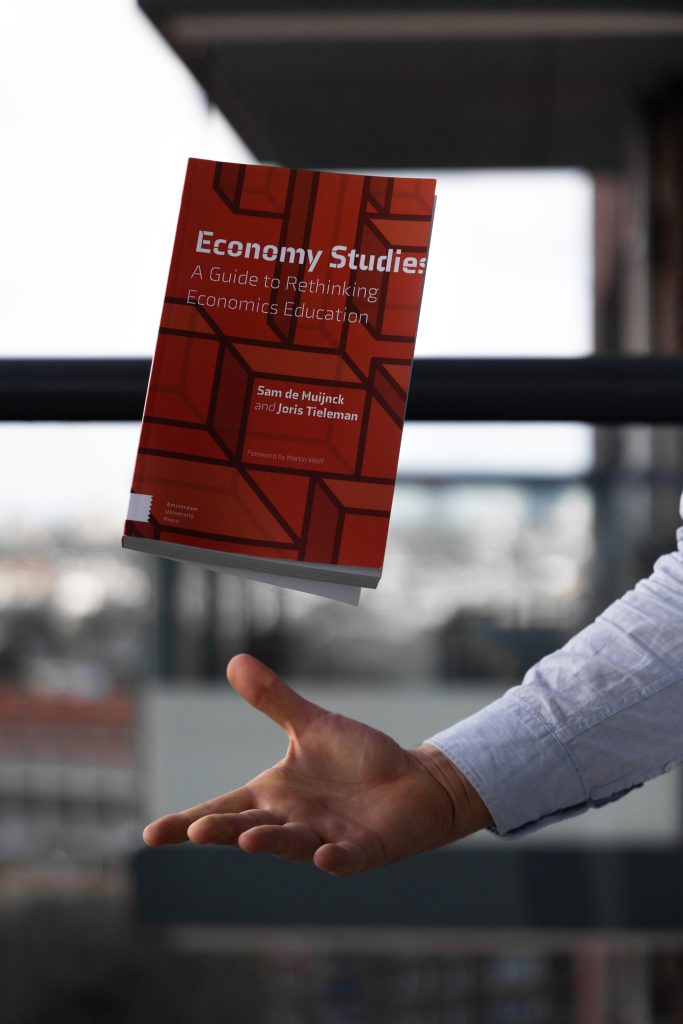Based on a clear conceptual framework and ten flexible building blocks, this handbook offers refreshing ideas and practical suggestions to stimulate student engagement and critical thinking across a wide range of courses.
Drawing on decades of ideas on how to improve economics education and a growing number of available resources, this book helps professors, teachers and students find the relevant teaching materials and provides a menu of options for reform.

Parts of the book
- Part I: Foundations outlines the basic principles underpinning a good economics education, such as pluralism and a real-world focus, and provides didactic suggestions to put these into practice.
- Part II: Building Blocks provides ten concrete yet flexible bundles of skills and knowledge, suggesting what to teach, how to teach it and what teaching materials to use.
- Part III: Tools offers seven practical tools for course and curriculum design and renewal.
The book in 13 min
Table of Contents
Part I: Foundations
Part II: Building Blocks
Part III: Tools
Part IV: Background Materials
Short Versions of the Book
Economy Studies for Students
Economy Studies for Program Directors and Deans
Economy Studies for Secondary Education
Economy Studies for Business Schools
Economy Studies for Public Administration & Law Programs
Economy Studies for Economics 101
Economy Studies for Microeconomics
Economy Studies for Macroeconomics
Economy Studies for Econometrics
Economy Studies for Labour Economics
Economy Studies for Public Economics
Economy Studies for Environmental Economics
Economy Studies for Development Economics
Economy Studies for Industrial Organisation
Economy Studies for Finance
Economy Studies for Monetary Economics
Economy Studies for International Economics
Economy Studies for Game Theory
Economy Studies for Behavioural Economics
What others say
“This book fills an important gap, offering an exciting look into the heterogeneity required to understand real-world economics.”
Arjen van Witteloostuijn, Dean of the School of Business and Economics at the Vrije Universiteit Amsterdam
“This excellent book offers to improve the education of economists by, first, exposing them to the real world, and, second, providing them with a variety of approaches to understanding the world. This is an ambitious goal; it is well achieved through clear thinking, extremely accessible writing, and intelligent use of a broad and open-ended toolkit.”
Neva Goodwin, author of the Economics in Context series and co-director of the Global Development And Environment Institute at Tufts University
“A very useful book. De Muijnck and Tieleman provide a clear overview of the different approaches in economics education. This forms an insightful framework to structure thinking about teaching economics. Subsequently, the book offers practical tools and interesting examples. This innovative book is relevant for all economics departments which are developing their curriculum further.”
Olaf van Vliet, Chair of the Department of Economics, Leiden University
“This is precisely the book that economics has been crying out for. It should fundamentally alter the way in which we teach, learn and practise economics and help us all appreciate what economics education has been missing for so long.”
Colin Mayer, Peter Moores Professor of Management Studies, Said Business School, University of Oxford.
“This book offers the next generation of economists an essential guide to new economic ideas, theories, models and narratives. This will be essential for navigating the policy challenges of an interconnected, complex but fragile world.”
William Hynes, Senior Advisor to the Secretary General and the Head of the New Approaches to Economic Challenges (NAEC) at the OECD
“This book is the most thorough and fundamental guidance I have ever seen for making economics education more relevant, more realistic, and more rigorous. Rather than critiquing current curricula, it provides helpful suggestions for teachers on how to make their courses suitable for the 21st century”
Irene van Staveren, author of Economics after the crisis and professor of Pluralist Development Economics at the Institute of Social Studies of Erasmus University Rotterdam
“Economics as a discipline is changing rapidly. The great financial crisis in 2008 showed that simple-minds economists policy advice, “leave everything to the market”, fails. The global threat of climate change has shown that global externalities are a not just a chapter in an economics textbook, but a key problem for the future of the planet. The revolution of behavioural economics has shaken the foundations of the discipline. Fitting into the general trend towards multidisciplinary science, this revolution has merged economics and psychology. All of this must lead rewriting to the textbooks for our discipline. Rethinking Economics Education has done just that.”
Coen Teulings, professor at Utrecht University and former Director of the Bureau for Economic Policy Analysis in the Netherlands